动词不定式的“时态”与句子谓语动词的时间关系
动词的时态与非谓语动词的关联与宾语从句与同位语从句的异同
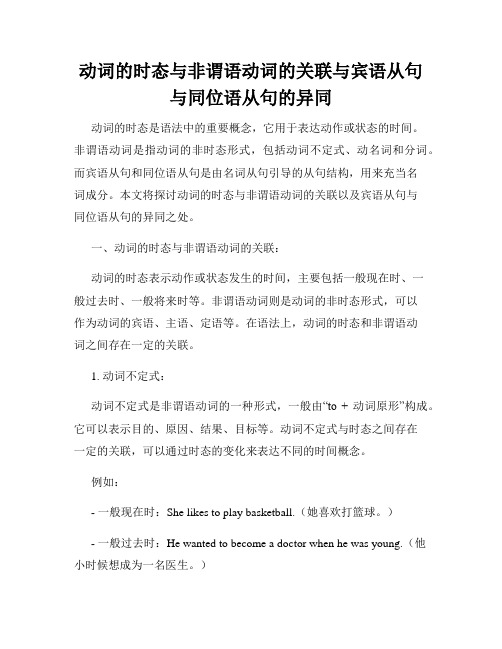
动词的时态与非谓语动词的关联与宾语从句与同位语从句的异同动词的时态是语法中的重要概念,它用于表达动作或状态的时间。
非谓语动词是指动词的非时态形式,包括动词不定式、动名词和分词。
而宾语从句和同位语从句是由名词从句引导的从句结构,用来充当名词成分。
本文将探讨动词的时态与非谓语动词的关联以及宾语从句与同位语从句的异同之处。
一、动词的时态与非谓语动词的关联:动词的时态表示动作或状态发生的时间,主要包括一般现在时、一般过去时、一般将来时等。
非谓语动词则是动词的非时态形式,可以作为动词的宾语、主语、定语等。
在语法上,动词的时态和非谓语动词之间存在一定的关联。
1. 动词不定式:动词不定式是非谓语动词的一种形式,一般由“to + 动词原形”构成。
它可以表示目的、原因、结果、目标等。
动词不定式与时态之间存在一定的关联,可以通过时态的变化来表达不同的时间概念。
例如:- 一般现在时:She likes to play basketball.(她喜欢打篮球。
)- 一般过去时:He wanted to become a doctor when he was young.(他小时候想成为一名医生。
)- 一般将来时:They are going to visit their grandparents next week.(下周他们打算去看望他们的祖父母。
)2. 动名词:动名词是非谓语动词的一种形式,一般由动词的-ing形式构成。
它可以作为主语、宾语、表语或定语等。
与动词的时态关联,动名词通常没有明确的时态概念,而是通过上下文来确定动作发生的时间。
例如:- 一般现在时:Listening to music helps me relax.(听音乐帮助我放松。
)- 一般过去时:I enjoyed playing football when I was a child.(小时候我喜欢踢足球。
)- 一般将来时:She is considering going abroad for further study.(她正在考虑出国深造。
动词不定式时态的用法

动词不定式时态的用法动词不定式是一种非谓语动词形式,由“to +动词原形”构成。
它具有名词、形容词和副词的特征,在句子中可以充当主语、宾语、定语、状语、宾语补足语等成分。
动词不定式的时态有一般式、进行式、完成式和完成进行式,下面我们来详细了解一下它们的用法。
一、一般式(to do)动词不定式的一般式表示的动作通常与谓语动词的动作同时发生或在其后发生。
1、表示将来的动作例如:“I have a lot of work to do tomorrow”(明天我有很多工作要做。
)这里的“to do”表示将来要做的工作。
2、用于某些动词后作宾语常见的这类动词有:want, hope, wish, decide, plan, expect 等。
比如:“She wants to buy a new dress”(她想买一件新裙子。
)3、作定语“There is nothing to worry about”(没什么可担心的。
)“to worry about”修饰“nothing”,表示“可担心的事情”。
4、目的状语“We come here to learn English”(我们来这里是为了学英语。
)“to learn English”表示来这里的目的。
二、进行式(to be doing)动词不定式的进行式表示的动作与谓语动词的动作同时进行。
例如:“He seems to be waiting for someone”(他似乎在等什么人。
)“to be waiting”与“seems”同时发生。
这种形式用得相对较少,通常在某些特定的语境中使用,以强调动作正在进行。
三、完成式(to have done)动词不定式的完成式表示的动作发生在谓语动词之前。
1、表示过去未曾实现的愿望、打算或计划比如:“I intended to have written to you, but I was too busy”(我本打算给你写信的,但我太忙了。
动词不定式时态用法

动词不定式时态用法动词不定式是一种非谓语动词形式,具有丰富的时态变化。
理解和掌握动词不定式的时态用法对于准确、流利地使用英语至关重要。
一、一般式(to do)动词不定式的一般式(to do)表示的动作通常与谓语动词的动作同时发生或在其后发生。
例如:“I have a lot of work to do”(我有很多工作要做。
)这里“to do”表示的动作是在“have”这个动作之后发生的。
再比如:“He decided to go abroad”(他决定出国。
)“decided”和“to go”几乎是同时发生的动作。
一般式还用于表达将来的动作,这种将来的意味往往是基于当前的计划或安排。
比如:“We are going to build a new house next year The materials to be used have been prepared”(我们明年要建一座新房子。
要用的材料已经准备好了。
)这里“to be used”表示将来要被使用的材料。
二、进行式(to be doing)动词不定式的进行式(to be doing)表示的动作与谓语动词的动作同时进行。
例如:“He pretended to be reading when I came in”(我进来时,他假装在读书。
)“pretended”和“to be reading”是同时发生的。
这种时态用法强调的是动作正在进行的过程。
三、完成式(to have done)动词不定式的完成式(to have done)表示的动作发生在谓语动词的动作之前。
比如:“I'm sorry to have kept you waiting so long”(很抱歉让你等了这么久。
)“to have kept”发生在“am sorry”之前。
再看这个例子:“She is said to have studied abroad for two years”(据说她在国外学习了两年。
动词不定式的完整讲解

动词不定式1、不定式的时态和语态:一般式:完成式:进行式:不定式的一般式表示的动作与谓语动词表示的动作一般没有时间先后顺序。
不定式的完成式表示额动作一般发生在谓语动词之前,强调动作的先后顺序。
不定式的进行式表示的动作一般与谓语动词同时进行。
翻译下列句子:1)I hope to finish reading the book again.2) You appear to have travelled quite a lot.3) It’s nice to be sitting here with you.4) I am v ery happy to be praised.5) It is impossible for him to be appointed.2、不定式的句法功能1)作主语To succeed calls for hard work.(不定式在句中作主语相当于名词或代词。
)It seemed selfish of him not to give them anything. (不定式作主语往往用形式主语it 代替)It’s difficult for us to finish the work in a week.2)作宾语不定式一般作动词的宾语,不直接作介词的宾语,但“疑问词+不定式”结构可以作介词的宾语。
如:Y our father has at last decided to quit smoking.Talk with friends about where to shop.只接to do 作宾语的常见动词有:afford, agree, arrange, ask, care, choose, decide, demand, determine, expect, help, hope, plan, hesitate, long, manage, offer, prepare, refuse, pretend, promise, want, intend ,prefer3)作表语,可以表示主语的具体内容,目的。
史上最完整动词不定式的用法

4.动词不定式作表语
1.主语和表语都是不定式(其含义ind to the enemy is to be cruel to the people.
To do that would be to cut the foot to fit the shoe.
2 . 主 语 是 以 aim, duty, hope, idea, intention, mistake, plan, proposal, job, suggestion 等为中心词的名词词组,或以 what 引导的名词性从句表示,表语用不定 式说明其内容,如:
1. 动词不定式作主语 动词不定式作主语,谓语动词用第三
人称单数。
To get there by car will take a whole day.
How to get enough money is still a question.
1. 动词不定式作主语
有时候为了保持句子平衡,常用it 作形式主语,放到句首,而将作真 实主语的动词不定式放到句末。
My idea is to climb the mountain from the north. My suggestion is to start work at once.
What I would suggest is to start work at once.
注:在某些句型中,当主语部分有动作 动词do 时,作表语的不定式可以省略符 号 “to”,如:
3. We climbed to the top of the tower ___D_____a better view of the area.
A. getting
B. got
C. having got
[汇总]谓语分类
![[汇总]谓语分类](https://img.taocdn.com/s3/m/89f2d43fbc64783e0912a21614791711cc797936.png)
1 什么是谓语?谓语(predicate),是句子中的必不可少的成分.谓语是由简单动词或动词短语(助动词或情态动词+主要动词)构成.谓语分为简单谓语和复合谓语.现分别举例如下(例句中的谓语用大写体打出):一.简单谓语由一个动词或短语动词构成的谓语,就是简单谓语.不管这些谓语动词是什么时态,语态,语气,都是简单谓语.例如:1.We PLANT trees in spring every year.我们每年春天都种许多树.2.The plane TOOK OFF at seven o'clock.飞机已在7点起飞.二.复合谓语复合谓语由两部分构成,其有不同的情况,现分别举例如下:1.由情态动词加一个不带to的不定式构成These students SHALL VISIT the museum tomorrow.这些学生明天将去参观博物馆.2.由个别情态动词和一个动词不定式构成<1>You OUGHT TO BEGIN with Fnglish 900.你应从<<英语900句>>开始学.<2>They SEEMED TO RESPECT the old professor very much.看起来他们非常尊敬这位老教授.3.许多带复合宾语的句子在变成被动结构后,也包含了一个复合谓语Jack WAS SEEN TO SWIM across the river.有人看到杰克游过河了.4.由连系动词加表语构成Taiwan IS AN ISLAND. 台湾是一个岛屿.The weather has turned cold. 天气已经变冷了.5.由情态动词和连系动词构成He MUST BE wrong. 他一定是搞错了.谓语说明主语的动作,状态或特征。
一般可分为两类:1),简单谓语由动词(或短语动词)构成。
可以有不同的时态,语态和语气。
如:We study for the people. 我们为人民学习。
非谓语动词与谓语动词的关系
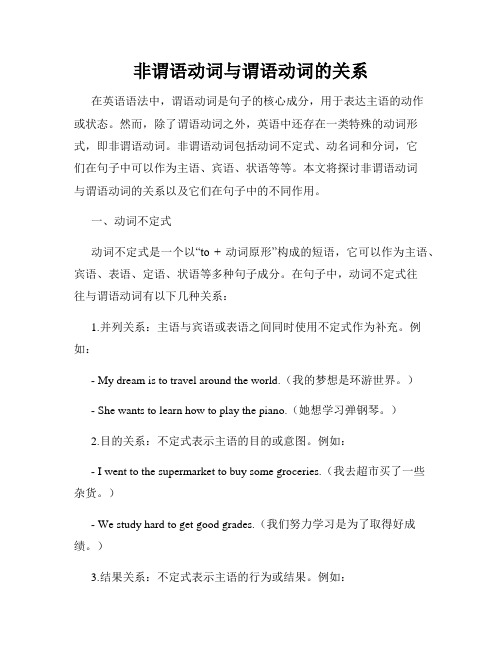
非谓语动词与谓语动词的关系在英语语法中,谓语动词是句子的核心成分,用于表达主语的动作或状态。
然而,除了谓语动词之外,英语中还存在一类特殊的动词形式,即非谓语动词。
非谓语动词包括动词不定式、动名词和分词,它们在句子中可以作为主语、宾语、状语等等。
本文将探讨非谓语动词与谓语动词的关系以及它们在句子中的不同作用。
一、动词不定式动词不定式是一个以“to + 动词原形”构成的短语,它可以作为主语、宾语、表语、定语、状语等多种句子成分。
在句子中,动词不定式往往与谓语动词有以下几种关系:1.并列关系:主语与宾语或表语之间同时使用不定式作为补充。
例如:- My dream is to travel around the world.(我的梦想是环游世界。
)- She wants to learn how to play the piano.(她想学习弹钢琴。
)2.目的关系:不定式表示主语的目的或意图。
例如:- I went to the supermarket to buy some groceries.(我去超市买了一些杂货。
)- We study hard to get good grades.(我们努力学习是为了取得好成绩。
)3.结果关系:不定式表示主语的行为或结果。
例如:- He ran so fast as to break the record.(他奔跑得如此快以至于打破了纪录。
)- The thief climbed over the wall to escape.(小偷翻过墙逃跑。
)二、动名词动名词是动词加上-ing形式构成的名词,它可以作为主语、宾语、表语、定语、状语等多种句子成分。
在句子中,动名词与谓语动词的关系有以下几种:1.主语关系:动名词作为句子的主语。
例如:- Swimming is good for your health.(游泳对身体有好处。
)- Reading is my favorite hobby.(阅读是我的最爱爱好。
高中非谓语动词讲解

非谓语动词在句中充当除谓语以外的句子成分的动词形式叫做非谓语动词;非谓语动词分为三种形式:不定式、动名词和分词分词包括现在分词和过去分词不定式一、不定式的作用1、作主语不定式作主语时,谓语用单数;往往用it 作形式主语,把不定式放在谓语后面;如:It took us two hours to finish the job.It is impossible for us to get there on time.It is very kind of you to help us.注意:1其他系动词如look, appear等也可用于此句型;2当不定式作主语的句子中又有一个不定式作表语时,不能用It is …to…的句型;试比较:It is to negate my own idea to believe him.错To believe him is to negate my own idea .对3It is+ adj. of / for sb. to do sth. 结构中,当不定式的逻辑主语和前面的形容词可以构成系表结构时,用of, 否则用for.2、作宾语(1)动词+不定式;如:He managed to escape from the fire.I find it hard to get along with him.it 作形式宾语注:下列动词通常用不定式作宾语:want, try, hope, wish, need, forget, know, promise, refuse, help, decide,begin, start, learn, agree, choose, get等(2)动词+疑问词+to , “特殊疑问句+不定式”相当于名词,作宾语;如:I don’t know what to do next/ how to do it next.I can’t decide when to go there.注意:不定式短语作宾语时,如果还带有宾语补足语,往往把不定式短语放在宾语补足语之后,用it 作形式宾语;如:I find it necessary to learn a foreign language.3、作宾语补足语(1)动词+宾语+不定式to do ;如:He warned me to be careful.I want you to speak to Tom.What makes you think so不带to的不定式注:可以用动词不定式做宾补的动词有:ask, tell, order ,want ,get, would like, like, advise, invite, allow, help, wish,warn, expect, prefer, encourage(2)表见解、看法的动词结构可为:动词+宾语+ to be 的不定式结构;如:We consider Tom to be one of the best students in our class.The book is believed to be useful.被动语态3 There +不定式;如:We didn’t expect there to be so many people there.我们没料到会有那么多人在那里;注意:1有些动词需用as 短语作补语,像regard, think, believe, take, consider;如:We regard Tom as our best teacher. 我们认为汤姆是我们最好的老师;Mary took him as her father. 玛丽把他当作自己的父亲;2在动词feel 一感,hear, listen to二听,have, let, make三让,notice, see, watch, observe, look at五看即:吾看三室两厅一感觉等后面的补足语中,不定式不带to,但变为被动语态后,必须带to;如:They saw the boy fall off the tree. The boy was seen to fall off the tree.3help后面作宾语补足语的不定式可以带to,也可以不带to.I often help him toclean the room.I helped him to find his things.4、作定语不定式作定语,修饰名词或代词,不定式和它所修饰的名词之间有逻辑上的主谓关系、动状关系、同位关系或动宾关系;不定式通常要放在这些被修饰的词后;如:I have a lot of work to do.动宾关系He is looking for a room to live in.动状关系He is the first person to think of the idea.主谓关系He has got a chance to go abroad.同位关系注意:1.不定式的逻辑主语是句子的主语时,不定式用主动形式表被动;如:Do you have anything else to say2.如果作定语的不定式是一个短语,则要保留不定时短语中的副词或介词;如:I need a pen to write with . I will wirte with the pen 我需要一直钢笔写字I have a little baby to look after .I must look after the little baby 我有一个婴儿要照看作状语,表示目的、结果、原因等,有时还有一些固定搭配的不定式短语,如in order to , so as to, so…as to, such …as to, ….enough to, too…to等;(1)做目的状语,to, only to 仅仅为了, in order to, so as to, sosuch….as to…如此···以便···如:He ran so fast as to catch the first bus. 他飞快地跑以便赶上第一班车;He came to the school to see his son.(2)作结果状语,表事先没有预料到的,要放在句子后面;如:He hurried to the post office only to find it was closed.He searched the room only to find nothing.(3)做原因状语;如:We were very excited to hear the news.I’m glad to see you.(4)做条件状语;如:To turn to the left , you could find a post office.5、作表语不定式可放在be动词后面,构成表语;如:The question is how to put it into practice.My question is when to leave.His dream is to be a doctor.Her work is to look after the babies.注意:1.不定式在句中作表语时,对应的谓语动词用单数;2.当助于是不定式时,表语不能用Ving形式,可用不定式;如:To see is to believe. 眼见为实6、独立结构;如:To tell you the truth, I don’t agree with you.To make matters worse, it began to rain.二、不定式的时态和语态1、不定式的时态(1)现在时:有时与谓语动词表示的动作同时发生,有时发生在谓语动词的动作之后;如:He seems to know this. I hope to see you again.(2)完成时:表示的动作发生在谓语动词表示的动作之前;如:I’m sorry to have given you so much trouble.He seems to have caught a cold.(3)进行时:表示动作正在进行,与谓语动词表示的动作同时发生;如:He seems to be eating something.(4)完成进行时:表示动作从过去某个时间开始,一直延续到现在,并有可能持续下去;如:She is known to have been working on the problem for many years.2、不定式的语态当不定式的逻辑主语是其动作的承受者时,就用被动式;如:He was seen to enter the hall. He asked to be sent to work in Tibet.三、省to 的动词不定式1、情态动词除ought 外,ought to2、Would rather, had better.3、感官动词see, watch, look at, notice, observe, hear, listen to, smell, feel 等后作宾补,省略to.注意:在被动语态中to 不能省略掉;如:I saw him dance. He was seen to dance. The boss made them work the whole night.They were made to work the whole night.4、使役动词let, have, make.5、由and, or 和than 连接的两个不定式,第二个to 可以省去;如:He wants to move to France and marry the girl.6、Help 可带to ,也可不带to, help sb. to do sth.7、Why…/Why not…8、But 和except 前是动词do 时,后面出现的动词用不带to 的动词不定式;试比较:He wants to do nothing but go out.He wants to believe anything but to take the medicine.9、通常在discover, imagine, suppose, think, understand 等词后,可以省去to be .如:He is supposed to be nice. 他应该是个好人;——I usually go there by train.——Why not ______ by boat for a changeA to try goingB trying to goC to try and goD try goingPaul doesn’t have to be made ______ . He always works hard.A learnB to learnC learnedD learning四、动词不定式的否定式;如:Tell him not to shut the window. She pretended not to see me when I passed by.Mrs. Smith warned her daughter ______ after drinking.A never to driveB to never driveC never drivingD never driveThe boy wanted to ride his bicycle in the street, but his mother told him ______.A not toB not to doC not do itD do not doThe patient was warned ______ food before the operation.A to eat noB eating notC not to eatD not eating动名词动名词具有动词和名词的特征,在句中作主语、表语、宾语和定语一、动名词的作用1、作主语谓语用单数;It代替动名词作主语,常用于如下结构:It’s no good/use doing···如:Seeing is believing.Playing with fire is dangerous.It’s no good waiting here.2、作宾语I enjoy listening to music.He often practices playing the piano in the evening.He is fond of playing basketball.He has given up smoking.Would you mind turning down your radio a little, please(1)只能接动名词作宾语的动词:admit,advise建议,risk,appreciate,envy嫉妒,avoid避免,consider考虑,delay延迟,deny否认,dislike不喜欢,enjoy,escape逃避,excuse原谅、宽恕,finish完成,forgive原谅,understand理解,give up放弃,imagine想象,keep保持,mind介意、在乎,miss未达到,practise 训练,put off推迟,resist抵抗,suggest建议、暗示can’t help 禁不住,can’t stand无法忍受,devote toto为介词致力于···,look forward to 期望、盼望,stick to坚持,be used to习惯于,object to反对,be busy忙于···,fee like想要···be surprised at 对……感到惊讶be proud of 以……为骄傲succeed in 在某方面成功be afraid of害怕give up 放弃(2)只能接不定式作宾语的动词:happen 碰巧,offer 主动提出,promise 答应,agree 同意,refuse拒绝,decide 决定,determine 决定、决心,pretend 假装,fail 未能够,learn,wish希望,hope,expect,afford 负担得起;(3)接动名词、不定式均可,意义相同的动词:like,love,dislike,hate,begin,star,continue,prefer,can’t bear/endure 无法忍受,cease停止(4)下列词接动名词和不定式均可,但意义不同的动词:forget,go on,mean,regret,remember,stop,try等Stop to do 停下来去做stop doing 停止做Forget to do 忘记要做forget doing 忘记做过Remember to do 记得要做remember doing 记得做过Regret to do 遗憾要做regret doing 后悔做过Try to do 企图做,尽力做try doing 试着做Go on to do 继续做另一件事go on doing 继续做同一件事Mean to do 打算做mean doing 意味做In some parts of London, missing a bus means _______ for another hour.A waitingB to waitingC waitD to be waiting答案:A(5)Need, require, want作“需要”讲,其后用动名词的主动式表示被动意义,be worth也有类似用法;如:The flowers need watering/to be watered.The problem is worth discussing.3、作表语此时的动名词可以和主语调换位置;如:My hobby is collecting stamps.Her job is washing, cleaning and taking care of the child.4、作定语动名词作定语,一般表示用途;如:a waiting room,a diving board,a reading room,a dining hallthere are a lot of swimming pools in the city.注:1现在分词作定语表动作,它与所修饰的名词之间存在逻辑上的主谓关系,可改写成一个定语从句;如果为单词,放在被修饰n之前,为短语,放在被修饰n之后;如:a sleeping boy =a boy who is sleepinga developing country =a country which is developing2动名词作定语通常表示它所修饰的名词的用途或性质,可改写成一个for的短语,两者不存在逻辑上的主谓关系;如:a washing machine = a mashine for washinga swimming pool = a pool for swimming二、动名词的时态和语态动名词的动作发生在谓语动词所表示的动作之前,通常要用完成式,否则都用一般式;如:We are interested in playing chess.He was praised for having finished the work ahead of time.I’m sorry for not having kept my promise.若主语是动名词所表示的动作的对象,动名词用被动语态;如:We must do something to prevent water from being polluted.I remember having been told a story.He was afraid of being scolded by the teacher.分词分词分为现在分词和过去分词;在句中作定语、状语、表语和宾语补足语;现在分词和过去分词的区别:在语态上,现在分词表示主动意义,过去分词表示被动意义;在时间上,现在分词表示的动作往往正在进行或者与谓语动词同时发生,过去分词表示的动作已经完成或没有一定的时间性;如:falling leaves 正在下落的树叶fallen leaves 已经落在地上的树叶一、分词的作用1、作定语(1)单个分词作定语,分词前置;如:The sleeping boy is my son.The excited people rushed into the building.A lost opportunity never returns.He is a retired worker.(2)分词短语作定语,分词后置;分词修饰不定代词something等要后置;个别分词如give,left等作定语也后置;如:The girl standing under the tree is my niece.The building built last year is our library.This is the question given.There is nothing interesting.(3)过去分词作定语与其修饰的词是被动关系,相当于一个被动语态的定语从句;如:Most of the people invited to the party were famous scientistsThe first textbook ______ for teaching English as a foreign language came out in the 16th century.A have writtenB to be writtenC being writtenD written答案:DWhat’s the language ______ in GermanyA speakingB spokenC be spokenD to speak答案:BPrices of daily goods ______ through a computer can be lower than store prices.A are boughtB boughtC been boughtD buying.答案:BWhen I got back home I saw a message pinned to the door ______ “Sorry to miss you; will call later.”A readB readsC to readD reading答案:D解析:reading 与pinned to the door 一样作message 的后置定语,相当于which read, pinned 和reading的逻辑主语都是message,它与pin是被动关系,用—ed 形式,与read 是主动关系,用—ing 形式2、作状语现在分词和过去分词在句中可以作时间、原因、方式、伴随、条件、结果等状语;Not receiving any letter from him, I gave him a call.As I didn’t receive any letter from him, I gave him a call.Given more attention, the trees could have grown better.If more attention was given, the trees could have grown better.条件Walking along the street, I ran across my old friend.Bitten by a snake, he was taken to hospital原因.Though defeated, he didn’t lose heart.让步He lay on the grass, looking into the sky.伴随He came running to tell me the good news.方式______ some officials, Napoleon inspected his army.A FollowedB Followed byC Being followedD Having been followed答案:BThere was a terrible noise______ the sudden burst of light.A followedB followingC to be followedD being followed答案:B______ , liquids can be changed into gases.A HeatingB To be heatedC HeatedD Heat答案:C注意:(1)选择现在分词还是过去分词,关键看主句的主语;如分词的动作是由主句的主语发出,分词就用现在分词,反之就用过去分词;试比较:BeingUsed for a long time, the book looks old.由于用了很长时间,这本书看上去很旧;Using the book, I find it useful.在使用的过程中,我发现这本书很有用;(2)分词作状语时,其逻辑主语必须和主句的主语一致,如果不一致,就用独立主格结构,即在分词前加上它的逻辑主语;现在分词的完成式主要用于作状语,一般不用作定语;When______, the museum will be open to the public next year.A completedB completingC being completedD to be completed答案:A______ such heavy pollution already, it may now be too late to clean up the river.A Having sufferedB SufferingC To sufferD Suffered答案:A3、作表语现在分词作表语多表示主语具有的特征,过去分词作表语多指主语所处的状态;如:The film is touching.The glass is broken.She looked tired with cooking.He remained standing beside the table.—I’m very______ with my own cooking. It looks nice and smells delicious.—Mm, it does have a ______ smell.A pleasant; pleasedB pleased; pleasedC pleasant; pleasantD pleased; pleasant答案:D4、作宾语补足语分词和不定式一样,在一些感官动词或使役动词后作宾语补足语;如:I smell something burning.I heard him singing the song.I heard my name called.I can’t make myself understood in English.I found my car missing.I’ll have my watch repaired.我想把我的手表修一下;The managers discussed the plan that they would like to see ______ the next year.A carry outB carrying outC carried outD to carry out答案:C5、作插入语其结构是固定的,意思上的主语并不是句子的主语;generally speaking 一般说来talking of speaking of 说到strictly speaking 严格地说judging from 从···判断all things considered 从整体来看taking all things into consideration 全面看来;如:Judging from his face, he must be ill.从他的脸色看,他一定是病了;Generally speaking, dogs can run faster than pigs.总的来说,狗比猪跑得快;一、分词的时态1、与主语动词同时;如:Arriving there, they found the boy dead.刚一到那儿,他们就发现那男孩死了;The secretary worked late into the night, ______ a long speech for the president.A to prepareB preparingC preparedD was preparing答案:B2、先于主语动词分词作时间状语,如果先于主动词的动作,且强调先后,要用having done;如:Having finished his homework, he went out for a walk.After he had finished his homework, he went out for a walk.做完作业,他出去散步;______ a reply, he decided to write again.A Not receivingB Receiving notC Not having receivedD Having not received答案:C二、分词的语态1、通常情况下,现在分词表示主动,过去分词表示被动;如:He is the man giving you/who gave you the book他就是给你书的那个人She is the girl stopped by/who was stopped by the car.她就是那个被车拦住的女孩;2、不及物动词的过去分词表示动作已经发生;像:gone, fallen, retired, grown-up, escaped, faded, returned等词;如:a retired person 一个退休的人 a fallen ball 一个落下来的球a burnt-out match 烧完了的火柴。
非谓语动词使用三原则

主动
被动
进行或 doing
being done
一般
完成 having done having been done
(3) -ed形式(-ed分词,过去分词)
done
非谓语动词的用法
非谓语动词可以从时间关系、主 被动关系和动词句型(以及名词句型、 形容词句型、介词等)来考虑。时间 关系、主被动关系主要需要理解。各 种句型主要靠背诵。
非谓语动词与逻辑主语是主动关系时,一般 用-ing形式(doing),
被动关系时一般用-ed形式(done)
3. 非谓语动词句型 很多时候,非谓语动词的形
式是由固定结构决定。这种固定 结构我们简称为非谓语动词句型。 这些句型主要涉及动词句型、名 词句型、形容词句型和介词
(1) 形容词句型。很多形容词一般跟不定 式,如:
非谓语动词使用三原则
动词 英语动词几乎可以做各种句子成分。
作谓语时叫谓语动词。
作主语、宾语、宾补、表语、定语和 状语时叫非谓语动词。
也就是说,英语动词既可以做谓语, 也可以做非谓语。
做不同成分时形式不一样。谓语动词 有谓语动词的形式,非谓语有非谓语的形 式。
谓语动词 做谓语的动词就是谓语动词。谓语动词有时态和
easy/difficult/happy/sorry/surprised to do
sth (个别跟ing形式如be busy doing) (2) 名词句型。有一些名词专跟不定式
如: the ability/chance/opportunity/way
/urge to do
(3) 介词、疑问词、序数词 介词+doing, 如for coming, by riding,
1. 时间关系 三种非谓语动词发生的时间与谓语动词发生的时间 有不同的先后关系。也就是把谓语动词发生的时间 作为参照物,看看非谓语动词是发生在谓语动词之 前、之后,还是同时。
动词不定式 语态时态
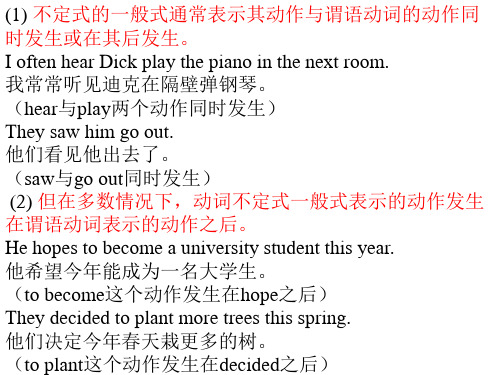
No harm seems to have been done. 似乎并没有造成损害。(作表语) I wish to be sent to work in the country. 我希望被派往乡下工作。(作宾语) In 1924 Nellie Taylor Ross of Wyoming became the first woman to be elected governor in the United States. 1924年,怀俄明州的内利· 泰勒· 罗斯成为美国第一位当选 州长的妇女。(作定语) I had to shout to be heard. 我大声呼喊以便能被听得见。(作状语) He did not like his intention to be laughed at. 他不喜欢他的意图被人取笑。(作宾语补足语) It’s a great honour to be invited to Mary’s birthday party. 被邀请参加玛丽的生日聚会十分荣幸。(作主语)
(3) 不定式的进行式通常表示其动作与谓语动词的动作同 时发生。 My supervisor happened to be correcting my dissertation when I came in. 当我进来的时候,碰巧我的导师在修改我的论文。 They seemed to be discussing something important. 他们似乎在讨论重要的事情。 (4) 不定式的完成式通常表示其动作在谓语动词的动作之 前完成。 I’m sorry to have kept you waiting. 很抱歉,让你久等了。 (to have kept发生在am所表示的时间之前) Robert is said to have written a book on war on Iraq. 听说罗伯特写了一本关于伊拉克战争的书。 (to have written 发生在is said 所表示的时间之前)
不定式的时态

答:动词不定式的时态和语态1.动词不定式的时态动词不定式有一般式、进行式、完成式、完成进行式四种时态变化形式,一般式和完成式有被动语态变化形式。
动词不定式的时态是以句中谓语动词的时间为依据的,具体表现在:1)不定式的一般式表示的动作或状态通常发生在谓语动作之后或同时发生。
例如:My parents have made plans to spend their holidays in Hainan next week. (to spend 发生在made plans之后)2)不定式的进行式表示其动作正在进行,与谓语动词发生的动作同时进行。
例如:When her parents came back last night, she happened to be doing her homework.3)不定式的完成式表达下列意义:(1)不定式的完成式表示的动作或状态通常发生在谓语动作之前。
例如:They are said to have just finished cleaning their bedrooms. (to have just finished 发生在they are said所表示的时间之前)(2)不定式的完成式用在intended, expected, meant, hoped, promised, planned, wished, thought, desired, was, were等词后,表示未曾实现的愿望、期待、想法、打算或计划等。
to have+过去分词表示动作,to have been表示状态。
例如:I meant to have dropped in at your office. (但没来)(3)用在seem, appear, think, consider, believe等后,表示动作先于另一个动作发生。
例如:I seem to have met her at a party before. (met在seem之前发生)(4)在should like或would like后用不定式完成式表示没有实现的愿望。
非谓语动词的时态了解非谓语动词的时态区别

非谓语动词的时态了解非谓语动词的时态区别非谓语动词的时态:了解非谓语动词的时态区别非谓语动词是指不具有主谓关系的动词形式,包括动词不定式、动名词和分词。
它们可以在句子中作多种不同的语法成分,如主语、宾语、状语等。
虽然非谓语动词本身没有时态,但它们与谓语动词在表达上存在一定的时态区别。
一、动词不定式动词不定式用来表达将来的动作、状态或目的。
它有两种时态形式:一般式和完成式。
1. 一般式:以动词原形构成,表示动作或状态的一般性、抽象性。
例如:- To read is to enrich the mind.(读书是丰富心灵的途径。
)- He likes to play basketball.(他喜欢打篮球。
)2. 完成式:由"to have + 过去分词"构成,表示在谓语动词发生之前已经完成的动作或状态。
例如:- I am glad to have finished my homework.(我很高兴已经完成了我的作业。
)- She seems to have lost her key.(她好像把钥匙弄丢了。
)二、动名词动名词是动词-ing形式,可以作为主语、宾语或状语等。
它和动词不定式相比,在时态上没有区别。
例如:- Swimming is good exercise.(游泳是一种很好的运动。
)- He enjoys playing the piano.(他喜欢弹钢琴。
)三、分词分词是动词的-ing形式或过去分词形式,具有形容词和副词的特点,用来修饰名词或代词。
分词也没有时态的变化,和动名词一样在时态上没有区别。
1. 现在分词:以动词-ing形式构成,表示主动或进行。
例如:- The running water is very clear.(流动的水非常清澈。
)- She saw a crying baby in the park.(她在公园看到一个哭泣的婴儿。
)2. 过去分词:通常以-ed、-en或不规则形式构成,表示被动或完成。
非谓语动词与谓语动词的句子区别
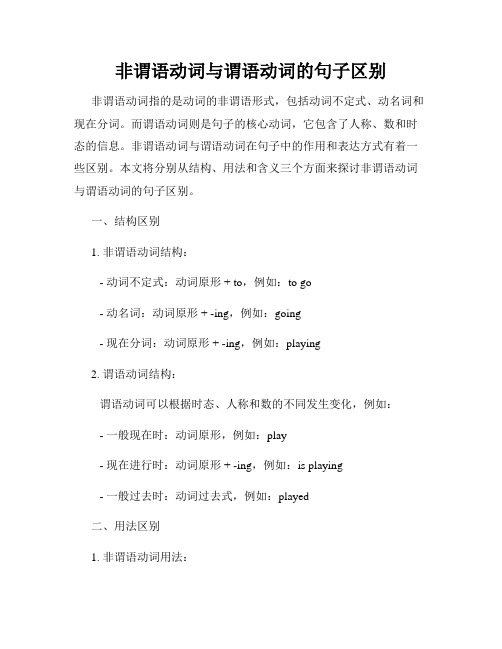
非谓语动词与谓语动词的句子区别非谓语动词指的是动词的非谓语形式,包括动词不定式、动名词和现在分词。
而谓语动词则是句子的核心动词,它包含了人称、数和时态的信息。
非谓语动词与谓语动词在句子中的作用和表达方式有着一些区别。
本文将分别从结构、用法和含义三个方面来探讨非谓语动词与谓语动词的句子区别。
一、结构区别1. 非谓语动词结构:- 动词不定式:动词原形 + to,例如:to go- 动名词:动词原形 + -ing,例如:going- 现在分词:动词原形 + -ing,例如:playing2. 谓语动词结构:谓语动词可以根据时态、人称和数的不同发生变化,例如:- 一般现在时:动词原形,例如:play- 现在进行时:动词原形 + -ing,例如:is playing- 一般过去时:动词过去式,例如:played二、用法区别1. 非谓语动词用法:动词不定式:- 作主语:To travel is my dream.- 作宾语:I want to go to the park.- 作补语:His goal is to become a doctor.- 作定语:I bought a book to read.- 作状语:He came to help me.动名词:- 作主语:Swimming is good for health.- 作宾语:I enjoy reading books.- 作补语:She kept on singing.- 作定语:I saw a running dog.- 作状语:He learned English by watching movies.现在分词:- 作主语:Running is a great form of exercise.- 作宾语:I heard him singing.- 作补语:She sat there, crying.- 作定语:I saw a boy playing basketball.- 作状语:Feeling tired, I went to bed early.2. 谓语动词用法:谓语动词常用于表示句子的主要动作或状态。
高中英语动词不定式语法总结

高中英语动词不定式语法总结一、动词不定式的定义和特点动词不定式是英语语法中的一种重要形式,用于表示一个将要发生或尚未发生的动作。
它具有名词、形容词和副词的特征,可以作为句子中的独立成分,与句子中的其他成分保持语法和语义的连贯性。
二、动词不定式的时态和语态1. 时态:动词不定式可以有不同的时态形式,包括一般式、进行式和完成式。
例如,不定式的一般式表示一个一般性的动作;不定式的完成式表示一个已完成的动作,发生在句子谓语动词之前。
2. 语态:动词不定式可以有被动语态形式,表示一个动作由他人或某物所导致。
三、动词不定式的复合结构动词不定式可以有自己的复合结构,即“名词所有格”或“动词-ing”形式加上“to do”。
这些结构可以作主语、宾语、表语等,与句子的主语形成语法上的关系。
四、动词不定式的句法功能动词不定式可以在句中充当各种句法成分,如主语、宾语、表语、定语等。
同时,它可以与一些词类连用,如形容词、副词、介词短语等。
五、常用动词不定式短语和结构1. it + 形容词/ 名词 + 不定式结构:表示将来的计划或情况。
2. be + 形容词 + to do:表示某人愿意或想要做某事。
3.感官动词 + 不定式结构:表示一种观察或感受。
4. 疑问词 + 不定式结构:可以用于询问目的或意图。
5. 介词 + 名词/ 动名词 + to do:表示一种方式或手段。
六、动词不定式的否定形式动词不定式的否定形式是在不定式符号前加上“not”。
同时,有一些特殊的否定结构,如“hardly/ scarcely + 否定词+ to do”、“not so much to do as to do”等。
七、动词不定式的疑问形式动词不定式的疑问形式是将疑问词直接放在不定式符号前,构成一个疑问句。
常见的疑问词有who/ what/ which/ how/ when/ where等。
八、动词不定式的省略形式在某些情况下,动词不定式可以省略,特别是在一些固定短语中。
英语学习非限定动词-动词不定式一般式所表示的时间关系
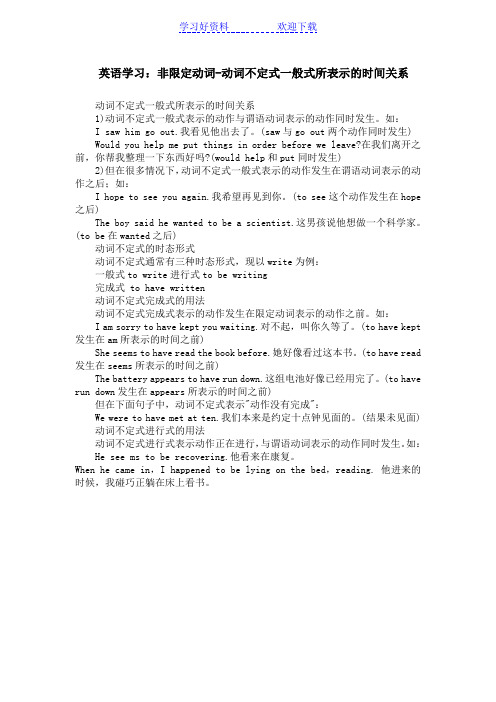
学习好资料欢迎下载英语学习:非限定动词-动词不定式一般式所表示的时间关系动词不定式一般式所表示的时间关系1)动词不定式一般式表示的动作与谓语动词表示的动作同时发生。
如:I saw him go out.我看见他出去了。
(saw与go out两个动作同时发生)Would you help me put things in order before we leave?在我们离开之前,你帮我整理一下东西好吗?(would help和put同时发生)2)但在很多情况下,动词不定式一般式表示的动作发生在谓语动词表示的动作之后;如:I hope to see you again.我希望再见到你。
(to see这个动作发生在hope 之后)The boy said he wanted to be a scientist.这男孩说他想做一个科学家。
(to be在wanted之后)动词不定式的时态形式动词不定式通常有三种时态形式,现以write为例:一般式to write进行式to be writing完成式 to have written动词不定式完成式的用法动词不定式完成式表示的动作发生在限定动词表示的动作之前。
如:I am sorry to have kept you waiting.对不起,叫你久等了。
(to have kept 发生在am所表示的时间之前)She seems to have read the book before.她好像看过这本书。
(to have read 发生在seems所表示的时间之前)The battery appears to have run down.这组电池好像已经用完了。
(to have run down发生在appears所表示的时间之前)但在下面句子中,动词不定式表示"动作没有完成":We were to have met at ten.我们本来是约定十点钟见面的。
非谓语动词与谓语动词的关系

非谓语动词与谓语动词的关系非谓语动词是指除了谓语动词以外的动词形式,包括不定式、动名词和现在分词。
在英语语法中,非谓语动词与谓语动词之间存在一种特殊的关系,它们可以在句子中充当不同的成分,起着不同的语法和语义作用。
本文将探讨非谓语动词与谓语动词的关系及其运用。
一、不定式与谓语动词的关系不定式是一种将动作或状态完整地表达出来的非谓语形式,通常由"to"加动词原形构成。
在句子中,不定式可以与谓语动词紧密结合,起到补充、目的、结果、条件等不同的语法作用。
1. 补充作用不定式作为谓语动词的补充,可以用来补充说明主语的特点、状态、性质等。
例句:She wants to learn Chinese.(她想学中文。
)I am glad to see you.(见到你很高兴。
)2. 目的作用不定式作为谓语动词的目的状语,表示动作的目的或者用途。
例句:He went to the library to borrow some books.(他去图书馆借了一些书。
)I am studying hard to pass the exam.(我正在努力学习以通过考试。
)3. 结果作用不定式作为谓语动词的结果状语,表示主语行为的结果或带来的后果。
例句:He ran so fast as to win the race.(他跑得很快,以至于赢得了比赛。
)The weather is so hot as to make people feel uncomfortable.(天气炎热,让人感到不舒服。
)4. 条件作用不定式作为谓语动词的条件状语,表示某条件下会发生的动作。
例句:If you want to lose weight, you should eat less and exercise more.(如果你想减肥,你就应该少吃多运动。
)I will go to the party tonight if I finish my work early.(如果我早点完成工作,我会去参加晚会。
非谓语动词的时态、.doc

非谓语动词的时态、.doc非谓语动词指的是不带有主语和谓语关系的动词,常见的有动词不定式、动名词、分词等。
在语法上,非谓语动词在句子中充当名词、形容词或副词的形式,虽然没有时态,但在句子中却很重要。
接下来我们主要讲述非谓语动词的时态和用法。
一、动词不定式的时态:动词不定式没有时态的变化,它本身不表示具体的时态,但是它所表示的动作和状态与主句谓语动词的时态有一定的关系。
动词不定式与谓语动词在动作时间上存在以下关系:1.不定式的动作同时或早于主句谓语动词的动作。
例子:We need to finish the task by tomorrow.(我们需要在明天之前完成任务。
)不定式的动作发生在主句谓语动词的动作发生之前,这个“需要完成任务”这个动作的时间是不确定的。
I am glad to have met you.(很高兴认识你。
)(她停下来和他交谈。
)He enjoys playing tennis.(他喜欢打网球。
)这个句子中,playing 是动名词,指正在进行的网球运动。
分词有过去分词和现在分词两种形式,它们都有时态和语态的变化,与不定式和动名词不同,它们能够表示被动、完成等语态和某些时间上的概念。
现在分词一般表示被动语态,也可以表示非持续性的动作或状态,其时态和主谓关系一致。
(睡着的孩子被抱到床上。
)过去分词形式分为 Regular 和 Irregular 两类。
Irregular 过去分词形式不规则,与动词原形不同(如 go –gone, eat –eaten),而 Regular 过去分词形式与原形相同,加 -ed(如 play – played,work – worked)。
(凯特已经完成了她的工作。
)在这个句子中,finished 是过去分词,表示完成了的状态。
四、总结:1.动词不定式、动名词和分词都没有时态的变化。
2.动词不定式和动名词的用法和谓语动词的位置有关。
3.分词的时态和语态与主谓关系一致,但要根据实际情况使用。
- 1、下载文档前请自行甄别文档内容的完整性,平台不提供额外的编辑、内容补充、找答案等附加服务。
- 2、"仅部分预览"的文档,不可在线预览部分如存在完整性等问题,可反馈申请退款(可完整预览的文档不适用该条件!)。
- 3、如文档侵犯您的权益,请联系客服反馈,我们会尽快为您处理(人工客服工作时间:9:00-18:30)。
动词不定式的时态与句子谓语动词的时间关系
动词不定式本身不表示“时”的特征,时间关系必须借助于句中谓语动词体现出来。
上面四种不定式的“时态”,与谓语动作的时间先后有于下关系:
I) 一般式:不定式的动作与谓语动作几乎同时发生或发生于谓语动作之后。
I heard her to say that. 我听到过她讲那件事。
(同时或几乎同时发生)
He seems to know this. 他好像知道这件事。
(同时或几乎同时发生)Mum must be very happy to know that you have passed the exam. 妈妈知道你考试过了关,她肯定很高兴。
(同时或几乎同时发生)
I want you to go to swim together with me later. 我要你稍后和我一道去游泳。
( 发生于谓语动作之后)
Mr. Wang was invited to make a speech at the meeting. 王先生受邀在会上讲话。
( 发生于谓语动作之后)
I hope to see you again. 我希望再见到你。
( 发生于谓语动作之后)
II) 进行式:强调不定式的动作正在发生并与谓语动词同时发生。
I’m so happy to be working with you. 和你一起工作我很高兴。
He pretended to be listening to the teacher attentively. 他装作在用心听老师讲课。
She seems to be looking for something. 她似乎是在找什么东西。
They seem to be getting along quite well. 看来他们相处得不错。
Jack is believed to be washing the car, 相信此时杰克正在洗车。
III) 完成式:表示不定式的动作已经发生,即发生在谓语动词动作之
前。
I’m sorry to have kept you waiting a long time. 对不起,让您久等了。
He seems to have caught a cold. 他似乎着了凉。
She seems to have known about it already. 她好像已经知道了那件事。
The student pretended not to have heard what the teacher said. 这学生装作没听到老师刚才讲了什么。
要是指将来情况,完成时不定式则表示在将来某时间点之前会完成的动作:
George expects to have finished the job by weekend. 乔治预计在周末以前干完这事。
IV) 不定式的完成进行式
如果不定式所表示的行为状态在谓语动词所表示的行为状态之前就已经发生,且一直持续到说话之时,就要用不定式的完成进行式,强调动作的连续性:
We are fortunate to have been learning from an excellent teacher. 真是幸运,一位优秀教师一直在教我们,。
He is said to have been working on a scientific research. 据说他一直在从事科研工作。
She was known to have been working on the solution to the heart diseases for many years. 据悉她多年来一直为解决心脏疾病问题而工作。
